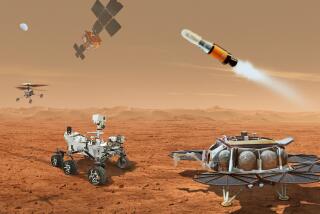Launch Pad for Flights of Wonder
- Share via
It is a rare scientific event that shakes humanity’s sense of itself. Copernicus’ suggestion four centuries ago that the Earth was not the center of the universe, Darwin’s argument last century that human beings were not descended from Adam and Eve but instead evolved from less exalted creatures--these are among the alarming ideas that now and again have shattered civilization’s repose.
To anyone blithely thinking that science had pretty much run out of mind-boggling discoveries, that current knowledge could only be extended by a few more decimal places, the announcement this month of signs of past life on Mars came as quite a surprise. But would it rank among the all-time great rude awakenings? Would it be, as Freud said of Copernicus’ discovery, a “cosmological blow?”
Now that some of the (red) dust has settled, scientists, philosophers and historians have begun responding to such questions. Their answers reflect everything from their personal cosmologies to their degree of cynicism about NASA, which announced the discovery after analyzing a Martian rock that fell in the Antarctic about 13,000 years ago.
Seldom are we consciously aware of it, but our emotions, outlooks and religious beliefs reflect our understanding of the natural world, scholars say. Every tribe has its creation myth, the story it tells itself about where it comes from and also what lies beyond the horizon. The Mars finding has such vast potential because it touches those two ancient curiosities at once, the yearning to know both about life’s origin and about other worlds.
“If it turns out to be true, it would be a compelling demonstration that life on Earth is not unique,” said Albert van Helden, a historian of astronomy at Rice University. “That seems to have major psychological and emotional implications for how we view the universe and our place in it.”
Alvin Toffler, author of “Future Shock” and “The Third Wave,” said that if the evidence holds up, the life on Mars discovery “is probably the most important event not just of this generation but of the millennium.”
Fritjof Capra, former particle physicist and author of the 1976 bestseller “The Tao of Physics,” sees the Mars evidence as part of a new philosophy. If confirmed, the finding shows that “the cosmos is alive,” he said. This view, he added, should engender a different attitude toward the natural world, including fellow earthlings. “You deal with life in terms of dialogue and cooperation, not in terms of domination and . . . control.”
To be sure, the NASA and Stanford scientists who analyzed the scavenged Martian meteorite, interpreting the embedded organic chemicals and vaguely bacteria-like structures as “evidence for primitive life on early Mars,” readily admit they could be mistaken.
And plenty of people have reacted to the news with ho-hum, end-of-the-century indifference. No matter how hard the Mars scientists tried to jazz up their press conference with video simulations of writhing Martian blobs, the poor creatures couldn’t compete with the cunningly obnoxious aliens that invaded earlier this summer in “Independence Day.”
But there is reason to believe that the human capacity for wonder, however oversubscribed, remains intact. In the days after NASA’s announcement, the agency’s new life on Mars site on the Internet (www.nasa.gov) received about 600,000 “hits” a day: the first instantaneous worldwide spread of potentially revolutionary scientific data.
“Nothing like that has happened before,” Toffler said, adding that the number of people who consulted NASA’s web site in a day was “probably greater than the total population of humans who for centuries even heard of Copernicus.”
‘Hostile’ or ‘Friendly’?
Historians of science distinguish between discoveries that revolutionize science and society--from Newton’s physics to Watson and Crick’s structure of DNA, hailed at the time as “the secret of life”--and those with even more philosophical oomph, capable of radically altering the human spirit.
Out of Western science’s long string of discoveries--X-rays, radiation, plate tectonics, genes--remarkably few pack that extra wallop, what historians have called an “ideological component.”
In his monumental book “Revolution in Science,” the historian I. Bernard Cohen nominates Copernicus, Darwin and Einstein (whose theories of relativity were taken to mean that ultimately there were no absolutes), and possibly Newton, Galileo (for revealing the moon and other planets to be shockingly mundane) and Freud (for shedding light on the renegade unconscious).
Whether there is extraterrestrial life “is one of the biggest questions” human beings can ask, perhaps second only to “is there life after death?” said Robert Shapiro, a New York University chemist and author of “Origins,” a survey of scientific theories about the beginning of life on Earth. “If this turns out to be correct,” he said of the Mars evidence, “with some historical perspective this will be regarded as a spectacular moment.”
A basic issue that it may help resolve, Shapiro said, is whether the universe is “hostile” or “friendly” to life. Origin-of-life experts advance different scenarios, with life’s emergence ranging from highly improbable or miraculous to downright likely.
It would be especially intriguing, Shapiro said, if the primitive life form that NASA says may have existed on Mars 3.6 billion years ago was radically different from anything on Earth. For one thing, that would appear to rule out the possibility that life started on Earth and drifted to Mars via meteorite (or vice versa). Moreover, it would suggest that the universe is unexpectedly accommodating, if not friendly, to life--a very different universe from the endless void long imagined.
“If we’ve got two planets that have both produced life, maybe the conditions [for starting life] aren’t that critical,” said chemist Richard Ash, a meteor expert at the American Museum of Natural History in New York City. “If all you need is wet and warm and some organic material and, presto, in a few million years you’ve got life, then we should be looking for a fairly simple and rugged mechanism” for our ultimate origins.
Although he says the NASA research team has not yet made a convincing case for this particular meteorite, he is excited about the potential implications of such a discovery: “As a philosophical point, it’s incredibly significant. It puts mankind another rung down the ladder of importance. . . . We become less special in some ways.”
Marvin Minsky, the noted MIT computer expert and cognitive scientist, agreed that the Mars finding would qualify as a historical “discontinuity”--a new idea representing a sharp break with conventional knowledge.
Yet he said it would be less dramatic than the discovery last decade of the oldest fossil bacteria on Earth, also about 3.5 billion years old, which showed that “the origin of life was much less miraculous than everyone had previously believed.”
Until the 1980s, he said, scientists generally thought that “life’s origin on Earth took billions of years to start--and therefore must have been an extremely unlikely event. But those recent discoveries of ancient fossils suggest that the appearance of self-reproducing structures in ‘primordial soup’ was more ‘routine’ than had been imagined.”
The “Martian discovery,” he said, “seems like another link in the chain.”
To some other origin-of-life experts, the Mars announcement was about as surprising as finding a mouse in the attic. “I guess I don’t have the gee-whiz feeling,” said Harold Morowitz, a biophysicist at George Mason University in Virginia. After reading the Mars research team’s report, which was published in the journal Science, he said he thought that the work was “extraordinarily careful” but that crucial questions had to be answered before he accepted it.
“My gut feeling is that wherever in the universe the chemical and physical conditions are right, life will originate,” he said. “Finding [life] elsewhere is very nice, but I suspect the entire universe is filled with organisms.”
Still, to assume the universe is a garden is one thing; to back that up with data is quite another. Van Helden, who maintains a web site about Galileo that is a nice gateway to the history of astronomy (www.rice.edu/Galileo), pointed out that the idea of life on Mars isn’t new. “But this is evidence,” he said of the new research. “And speculation is a very different thing from evidence.”
In that sense, he added, it’s an eye-opener rather like the seminal “Earthrise” photo taken from the moon. “We’ve all grown up knowing that the Earth was a planet,” he said. “But that one photograph had a profound psychological impact.”
Scientists Emboldened
That the new evidence was gleaned from a chunk of Martian meteorite picked up on an Antarctic ice field drives home the point that the planets exist not in lonely isolation but are in contact with one another, “mixing” their environments, said Anthony Aveni, an astronomer and historian at Colgate University in Hamilton, N.Y.
“I thought, ‘Well, we’ve changed the meaning of the word ‘environment,’ ” he said. “Twenty or 30 years ago, the notion that a chip of the moon or Mars could get to Earth was ludicrous.”
Nonetheless, he remains deeply skeptical of the evidence. “The reason I fail to be titillated is that what has been discovered is not necessarily ‘life,’ he said. “They’re structures that can be consistent with life, but that’s a long way from a creature with a brain that can build pyramids.”
And yet scientists seeking intelligence beyond Earth were emboldened by NASA’s announcement. “This first tantalizing evidence that ours may not be the only planet ever to nurture life gives us good reason to renew our efforts to detect more advanced civilizations in the cosmos,” Paul Shuch, executive director of the Search for Extra-Terrestrial Intelligence League, said in a statement.
A notable aspect of the current outburst of Mars speculation is that, with the exception of creationists and Christian fundamentalists who adhere to a literal interpretation of Genesis, few people seem troubled by the finding of possible past life elsewhere in the cosmos. If anything, there seems to be great hope and excitement over the opposite proposition, an idea that would fit on a bumper sticker: Life happens.
Capra’s new book, “The Web of Life,” due out next month, gleefully makes just such a point. Drawing on trendy new fields of chaos theory and complexity, he argues that nonliving chemical systems have an extraordinary, innate probabilistic tendency to organize themselves into crude living entities endowed with the potential to evolve. According to this view, life is no miracle.
“We know today that the characteristic compounds of life are present in abundance throughout the universe,” he said. “And there are billions and billions of planetary systems. Thus it’s likely that life has emerged again and again throughout the universe.”
“Psychologically,” he said of the Mars finding, “I think this needs some time to sink in.”
“Life elsewhere in the universe? Sure, why not? It’s a big place,” said Michael Ruse, a philosopher of biology at Guelph University in Canada. “If it’s possible on Mars, it’s possible somewhere in the Andromeda [galaxy].”
One implication of the new research that is already clear to scientists and lay people alike might be summarized as “never say never.” In the early 1980s, an expert panel from the National Academy of Sciences concluded that “there is strong evidence that neither the planets (other than Earth) nor their satellites provide conditions consistent with the maintenance of life.”
“I’m of a different philosophy,” NYU’s Shapiro said, referring to such sweeping pessimism. “There’s a tremendous lot about the universe we’ve yet to learn. We haven’t even started to find out what kind of universe we’re living in. This meteorite is just one clue letting us know how little we know.”






